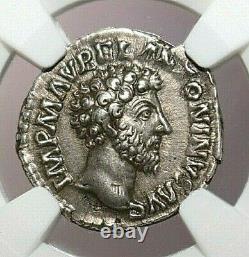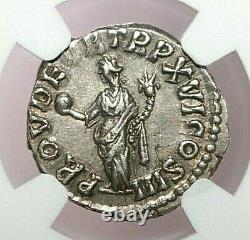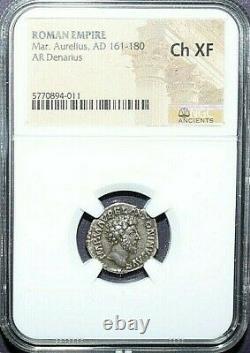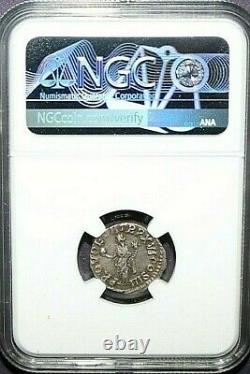
- Homepage
- Certification
- Coin Id
- Composition
- Grade
- Ruler
- Antoninus Pius (52)
- Augustus (141)
- Caracalla (53)
- Constantine I (57)
- Constantine Ii (29)
- Domitian (58)
- Gallienus (37)
- Gordian Iii (62)
- Hadrian (100)
- Marcus Aurelius (68)
- Nero (113)
- Nerva (31)
- Philip I (66)
- Septimius Severus (35)
- Severus Alexander (69)
- Theodosius Ii (32)
- Tiberius (69)
- Trajan (97)
- Trajan Decius (28)
- Vespasian (76)
- Other (1599)
- Year-mint-denom
NGC Ch XF ROMAN COINS Marcus Aurelius, AD 161-180. AR Denarius. MAX/026






Dear Customers, you will receive exactly the same item which you see on the pictures, not similar or other. Please read the description carefully and review the photos. A marble bust of Marcus Aurelius at the Musée Saint-Raymond.
8 March 161 17 March 180 (19 years). 17 March 180 (aged 58) Sirmium. Marcus Aelius Aurelius Verus Caesar see section Name. Imperator Caesar Marcus Aurelius Antoninus Augustus.
Followed by Year of the Five Emperors. Part of a series on. 26 April 121 17 March 180 was Roman emperor. From 161 to 180 and a Stoic.
He was the last of the rulers known as the Five Good Emperors. A term coined some 13 centuries later by Niccolò Machiavelli. , and the last emperor of the Pax Romana. An age of relative peace and stability for the Roman Empire. He served as Roman consul. In 140, 145, and 161. Marcus was born during the reign of Hadrian. To the emperor's nephew, the praetor Marcus Annius Verus. And the heiress Domitia Calvilla. His father died when he was five, and Marcus was raised by his mother and grandfather. Died in 138, the emperor adopted Marcus' uncle Antoninus Pius. In turn, Antoninus adopted Marcus and Lucius.Hadrian died that year and Antoninus became emperor. Now heir to the throne, Marcus studied Greek and Latin under tutors such as Herodes Atticus.
He kept in close correspondence with Fronto for many years afterwards. Marcus married Antoninus' daughter Faustina.After Antoninus died in 161, Marcus acceded to the throne alongside his adoptive brother, who took the name Lucius Verus. The reign of Marcus Aurelius. Was marked by military conflict. In the East, the Roman Empire fought successfully. With a revitalized Parthian Empire.
And the rebel Kingdom of Armenia. However, these and other Germanic peoples. Began to represent a troubling reality for the Empire. He modified the silver purity of the Roman currency. The persecution of Christians in the Roman Empire. Appears to have increased during his reign, but it is unknown how involved Marcus was in the persecution. Broke out in 165 or 166 and devastated the population of the Roman Empire. Causing the deaths of five million people. Lucius Verus may have died from the plague in 169. Unlike some of his predecessors, Marcus chose not to adopt an heir.Who married Lucius, and Commodus. Whose succession after Marcus has been a subject of debate among both contemporary and modern historians.
And Equestrian Statue of Marcus Aurelius. Still stand in Rome, where they were erected in celebration of his military victories. The writings of "the philosopher" as contemporary biographers called Marcus, are a significant source of the modern understanding of ancient Stoic philosophy.
They have been praised by fellow writers, philosophers, monarchs, and politicians centuries after his death. Bust of Marcus Aurelius in the Archaeological Museum of Istanbul. The major sources depicting the life and rule of Marcus are patchy and frequently unreliable.The most important group of sources, the biographies contained in the Historia Augusta. Claimed to be written by a group of authors at the turn of the 4th century AD, but it is believed they were in fact written by a single author (referred to here as'the biographer') from about 395 AD. The later biographies and the biographies of subordinate emperors and usurpers are unreliable, but the earlier biographies, derived primarily from now-lost earlier sources Marius Maximus.
Or Ignotus, are much more accurate. For Marcus' life and rule, the biographies of Hadrian. Are largely reliable, but those of Aelius Verus. A body of correspondence between Marcus's tutor Fronto. And various Antonine officials survives in a series of patchy manuscripts, covering the period from c.Marcus' own Meditations offer a window on his inner life, but are largely undateable and make few specific references to worldly affairs. The main narrative source for the period is Cassius Dio.
A Greek senator from Bithynian. Who wrote a history of Rome from its founding to 229 in eighty books. Dio is vital for the military history of the period, but his senatorial prejudices and strong opposition to imperial expansion obscure his perspective.
Some other literary sources provide specific details: the writings of the physician Galen. On the habits of the Antonine elite, the orations of Aelius Aristides. On the temper of the times, and the constitutions preserved in the Digest. On Marcus's legal work. Main article: Early life of Marcus Aurelius.
A bust of young Marcus Aurelius Capitoline Museum. His modern biographer, writes of the bust:'This is certainly a grave young man.
Marcus was born in Rome. His name at birth was supposedly Marcus Annius Verus. But some sources assign this name to him upon his father's death and unofficial adoption by his grandfather, upon his coming of age, or at the time of his marriage. He may have been known as Marcus Annius Catilius Severus, at birth or at some point in his youth, or Marcus Catilius Severus Annius Verus.
Upon his adoption by Antoninus as heir to the throne, he was known as Marcus Aelius Aurelius Verus Caesar and, upon his ascension, he was Marcus Aurelius Antoninus Augustus until his death; Epiphanius of Salamis. In his chronology of the Roman emperors On Weights and Measures. Calls him Marcus Aurelius Verus.
Marcus' paternal family was of Roman Italo-Hispanic origins. His father was Marcus Annius Verus (III). Was of Italian origins with legendary claims of descendance from Numa Pompilius. And a branch of it moved to Ucubi. A small town south east of Córdoba.
This branch of the Aurelii based in Roman Spain, the Annii Veri , rose to prominence in Rome in the late 1st century AD. Marcus' great-grandfather Marcus Annius Verus (I) was a senator. And (according to the Historia Augusta) ex- praetor.
His grandfather Marcus Annius Verus (II). Marcus was a member of the Nerva-Antonine dynasty. Was the mother of Rupilia and her half-sister, Hadrian's wife Sabina. Marcus' mother, Domitia Lucilla Minor. (also known as Domitia Calvilla), was the daughter of the Roman patrician P.
Calvisius Tullus and inherited a great fortune described at length in one of Pliny. S letters from her parents and grandparents. Her inheritance included large brickworks on the outskirts of Rome a profitable enterprise in an era when the city was experiencing a construction boom and the Horti Domitia Calvillae (or Lucillae), a villa on the Caelian hill. Marcus himself was born and raised in the Horti and referred to the Caelian hill as'My Caelian'. The adoptive family of Marcus was of Roman Italo-Gallic origins.
Into which Marcus was adopted at the age of 17, was a Sabine. His adoptive father, came from the Aurelii Fulvi, a branch of the Aurelii based in Roman Gaul.Marcus' sister, Annia Cornificia Faustina. Was probably born in 122 or 123.
His father probably died in 124, during his praetorship, when Marcus was three years old. Though he can hardly have known his father, Marcus wrote in his Meditations that he had learnt'modesty and manliness' from his memories of his father and from the man's posthumous reputation.
Instead, Marcus was in the care of'nurses', and was raised after his father's death by his grandfather Marcus Annius Verus (II), who had always retained the legal authority of patria potestas. Over his son and grandson.
Technically this was not an adoption, the creation of a new and different patria potestas. Described as Marcus' maternal great-grandfather, also participated in his upbringing; he was probably the elder Domitia Lucilla's stepfather. Marcus was raised in his parents' home on the Caelian Hill. An upscale area with few public buildings but many aristocratic villas. Marcus' grandfather owned a palace beside the Lateran.
Where he would spend much of his childhood. Marcus thanks his grandfather for teaching him'good character and avoidance of bad temper'. He was less fond of the mistress his grandfather took and lived with after the death of his wife Rupilia. Marcus was grateful that he did not have to live with her longer than he did.
Marcus was educated at home, in line with contemporary aristocratic trends; he thanks Catilius Severus for encouraging him to avoid public schools. One of his teachers, Diognetus, a painting master, proved particularly influential; he seems to have introduced Marcus Aurelius to the philosophic way of life. In April 132, at the behest of Diognetus, Marcus took up the dress and habits of the philosopher: he studied while wearing a rough Greek cloak.And would sleep on the ground until his mother convinced him to sleep on a bed. A new set of tutors the Homeric. Took over Marcus' education in about 132 or 133. Marcus thanks Alexander for his training in literary styling. Alexander's influence an emphasis on matter over style and careful wording, with the occasional Homeric quotation has been detected in Marcus' Meditations.
Accession of Marcus Aurelius and Lucius Verus (161). Busts of the co-emperors Marcus Aurelius (left) and Lucius Verus. After Antoninus died in 161, Marcus was effectively sole ruler of the Empire.
The formalities of the position would follow. The senate would soon grant him the name Augustus and the title imperator. And he would soon be formally elected as Pontifex Maximus , chief priest of the official cults. Marcus made some show of resistance: the biographer writes that he was'compelled' to take imperial power.
This may have been a genuine horror imperii ,'fear of imperial power'. Marcus, with his preference for the philosophic life, found the imperial office unappealing. His training as a Stoic, however, had made the choice clear to him that it was his duty. Although Marcus showed no personal affection for Hadrian (significantly, he does not thank him in the first book of his Meditations), he presumably believed it his duty to enact the man's succession plans. Thus, although the senate planned to confirm Marcus alone, he refused to take office unless Lucius received equal powers.The senate accepted, granting Lucius the imperium , the tribunician power, and the name Augustus. Marcus became, in official titulature, Imperator Caesar Marcus Aurelius Antoninus Augustus; Lucius, forgoing his name Commodus and taking Marcus' family name Verus, became Imperator Caesar Lucius Aurelius Verus Augustus.
It was the first time that Rome was ruled by two emperors. In spite of their nominal equality, Marcus held more auctoritas. He had been consul once more than Lucius, he had shared in Antoninus' rule, and he alone was Pontifex Maximus. It would have been clear to the public which emperor was the more senior. Immediately after their senate confirmation, the emperors proceeded to the Castra Praetoria. The camp of the Praetorian Guard. Lucius addressed the assembled troops, which then acclaimed the pair as imperatores. Then, like every new emperor since Claudius.Lucius promised the troops a special donative. This donative, however, was twice the size of those past: 20,000 sesterces. Per capita, with more to officers. In return for this bounty, equivalent to several years' pay, the troops swore an oath to protect the emperors.
Upon his accession he also devalued the Roman currency. He decreased the silver purity of the denarius from 83.5% to 79% the silver weight dropping from 2.68 g (0.095 oz) to 2.57 g (0.091 oz). Antoninus' funeral ceremonies were, in the words of the biographer,'elaborate'. If his funeral followed those of his predecessors, his body would have been incinerated on a pyre at the Campus Martius. And his spirit would have been seen as ascending to the gods' home in the heavens. Marcus and Lucius nominated their father for deification.In contrast to their behaviour during Antoninus' campaign to deify Hadrian, the senate did not oppose the emperors' wishes. Or cultic priest, was appointed to minister the cult of the deified Divus Antoninus. Antoninus' remains were laid to rest in Hadrian's mausoleum, beside the remains of Marcus' children and of Hadrian himself. The temple he had dedicated to his wife, Diva Faustina, became the Temple of Antoninus and Faustina. It survives as the church of San Lorenzo in Miranda.
In accordance with his will, Antoninus' fortune passed on to Faustina. Marcus had little need of his wife's fortune. Indeed, at his accession, Marcus transferred part of his mother's estate to his nephew, Ummius Quadratus. Faustina was three months pregnant at her husband's accession. During the pregnancy she dreamed of giving birth to two serpents, one fiercer than the other. On 31 August, she gave birth at Lanuvium. Aurelius Fulvus Antoninus and Lucius Aurelius Commodus. Aside from the fact that the twins shared Caligula. S birthday, the omens were favorable, and the astrologers drew positive horoscopes for the children.The births were celebrated on the imperial coinage. Marcus acquired the reputation of a philosopher king.
Within his lifetime, and the title would remain after his death; both Dio and the biographer call him'the philosopher'. Christians such as Justin Martyr. Athenagoras, and Eusebius also gave him the title. The last named went so far as to call him "more philanthropic and philosophic" than Antoninus and Hadrian, and set him against the persecuting emperors Domitian and Nero to make the contrast bolder.
"Alone of the emperors, " wrote the historian Herodian, "he gave proof of his learning not by mere words or knowledge of philosophical doctrines but by his blameless character and temperate way of life". Concludes that Marcus' legacy is tragic, because the emperor's Stoic philosophy which is about self-restraint, duty, and respect for others was so abjectly abandoned by the imperial line he anointed on his death. In the first two centuries of the Christian era, it was local Roman officials who were largely responsible for the persecution. In the second century, the emperors treated Christianity as a local problem to be dealt with by their subordinates. The number and severity of persecutions of Christians in various locations of the empire seemingly increased during the reign of Marcus.
The extent to which Marcus himself directed, encouraged, or was aware of these persecutions is unclear and much debated by historians. The early Christian apologist, Justin Martyr, includes within his First Apology written between 140 and 150 A.
A letter from Marcus Aurelius to the Roman senate (prior to his reign) describing a battlefield incident in which Marcus believed Christian prayer had saved his army from thirst when "water poured from heaven, " after which, immediately we recognized the presence of God. Marcus goes on to request the senate desist from earlier courses of Christian persecution by Rome.
The city (of Tarsus in Cilicia) had a temple of Augustus. Bust of Vibia Aurelia Sabina. Had at least 13 children during their 30-year marriage, including two sets of twins. One son and four daughters outlived their father.
(150182), married her father's co-ruler Lucius Verus. Had issue from both marriages.(born 151), married Gnaeus Claudius Severus. Tiberius Aelius Antoninus (born 152, died before 156). Unknown child (died before 158). (born 159), married Marcus Peducaeus Plautius Quintillus.
(born 160), married Marcus Petronius Sura Mamertinus. Titus Aurelius Fulvus Antoninus (161165), elder twin brother of Commodus.(Commodus) (161192), twin brother of Titus Aurelius Fulvus Antoninus, later emperor, married Bruttia Crispina. (170 died before 217), married Lucius Antistius Burrus. The item "NGC Ch XF ROMAN COINS Marcus Aurelius, AD 161-180. MAX/026" is in sale since Tuesday, January 5, 2021.
This item is in the category "Coins & Paper Money\Coins\ Ancient\Roman\ Imperial (27 BC-476 AD)".bean_medals" and is located in Riga, centrs. This item can be shipped worldwide.
- Cleaned/Uncleaned: Cleaned
- Modified Item: No
- Certification Number: 5770894-011
- Certification: NGC
- Date: AD 161-180
- Grade: Ch XF
- Year: AD 161-180
- Composition: Silver
- Ruler: Marcus Aurelius
- Historical Period: Roman: Imperial (27 BC-476 AD)
- Denomination: Denarius
- Era: Ancient

